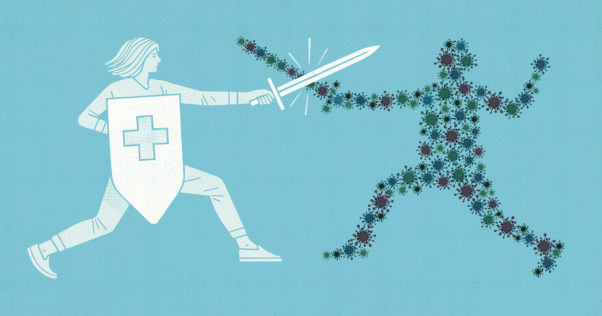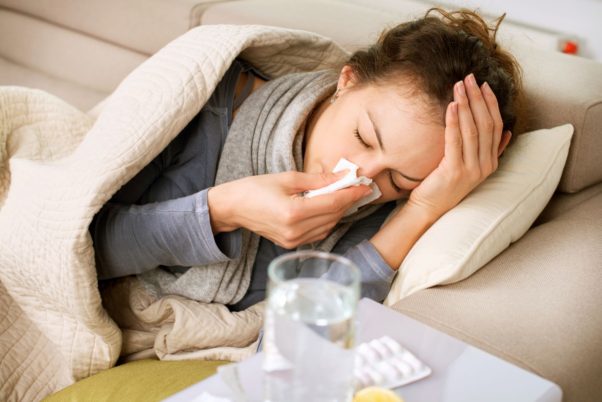Keep Immune System Healthy to Fight Flu
Getting a good night’s sleep and maintaining a healthy lifestyle are two ways to battle the flu bug, as its presence increases across the nation.

Getting proper sleep, nutrition and exercise can help your immune system battle influenza and other bugs during the winter. (Illustration: Dan Page)
The Centers for Disease Control and Prevention is reporting high activity of influenza and influenza-like illnesses across the country. In its latest report, the CDC estimates that during this season in the United States, 9.7 million cases of flu have been diagnosed, 54 children and 4,800 adults have died due to influenza.
Having a healthy immune system could help you fight off the flu virus and other bugs if you are exposed, said Libby Richards, an associate professor of nursing who specializes in public health in Purdue University’s School of Nursing.
“There are many things about immunity that are beyond our control but there are some things we can do to help maintain a strong immune system so we can take care of ourselves,” Richards said.
Some tips to keep your immune system strong include getting a proper amount of sleep each night, maintaining a healthy weight, eating plenty of fruits and vegetables, drinking plenty of fluids, meeting physical activity guidelines, not smoking, limiting alcohol consumption and limiting stress.
“Seven to nine hours of sleep is recommended when you are feeling sick, as well as when you are healthy,” Richards said. “In addition to getting adequate sleep when ill, it is also important to rest during the day and try to avoid overexertion.”
“If you like to exercise at the gym, be safe and responsible during this cold and flu season. If you have a productive cough, do everyone a favor and avoid the gym. Staying home is a perfect way to not spread germs,” Richards said. “If you have mild cold symptoms and you feel you have the energy to exercise, go for it as exercise might help you feel better, but consider reducing the duration or intensity of your exercise. If you are having fatigue, body aches, stomach issues, you should stay home and rest as exercise could increase your chance of an injury.”
It can be challenging to keep germs contained in one’s house if there are children.
“Kids touch everything, which is one big way germs are spread. Kids also tend not to understand or value what ‘personal space’ is and can be in each other’s faces all the time,” Richards said. “Parents, teachers and caregivers can demonstrate proper handwashing and cough hygiene all year long – not just during flu season.”
Richards encourages using sanitizing wipes often to clean things that kids commonly touch, such as remote controls, phones, tablets, toys, doorknobs and faucets.
“As much as we love to show affection with kisses, it’s possible to spread the flu one to three days prior to the start of symptoms,” Richards said.
Do I have the flu?
A person has all the signs of flu: fever, chills, cough, headache and fatigue. But just because the signs are there, it isn’t a foregone conclusion that flu is the cause as there are other viruses and illnesses with shared symptoms.
Influenza-like illness, or ILI, is classified as an illness with a fever of 100 degrees or higher and a cough and/or sore throat. ILI can be caused by viruses including respiratory syncytial virus and adenovirus.
Not all patients who present with flu-like symptoms are tested for influenza. When patients are not tested but present with similar symptoms, they are often diagnosed with ILI, said Richards.
If you are diagnosed with an ILI, Richards says you should treat it like other illnesses – including the flu – and stay home, rest, stay hydrated and take over-the-counter medications.
Common illnesses, including strep throat and sinus infections, are not ILI as they have a known cause. And there are subtle differences between a sinus infection and influenza.
“A sinus infection can cause pain in the face or sinus areas, while the flu will cause aches and pains throughout the body,” Richards says. “Both can cause people to cough. A sinus infection tends to only have a cough at night when someone is lying down, whereas the flu tends to cause coughing during the day as well.”
Article written by Matthew Oates of Perdue University

This article was written by the guest author listed at the end of the article.




